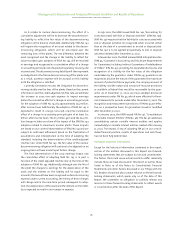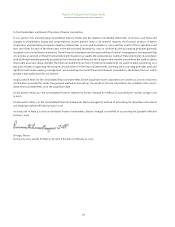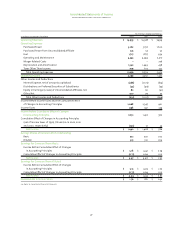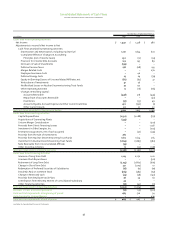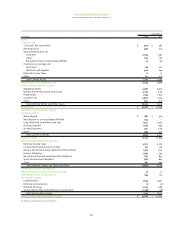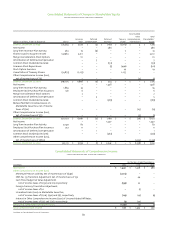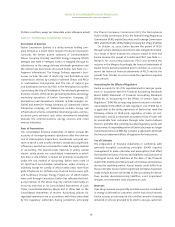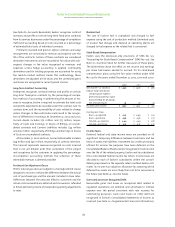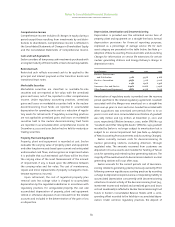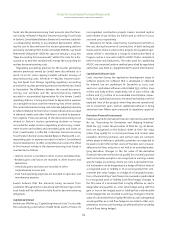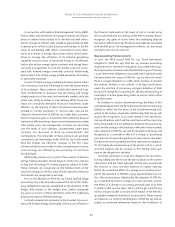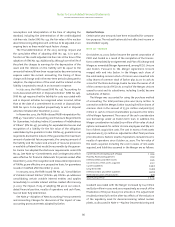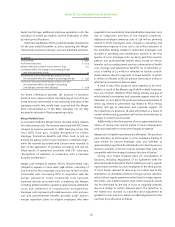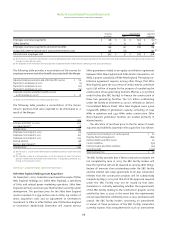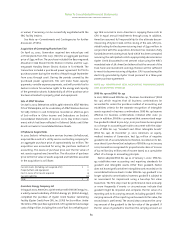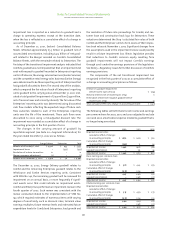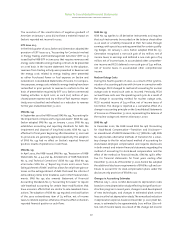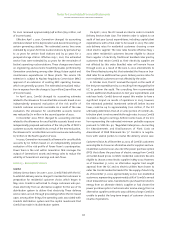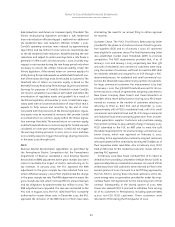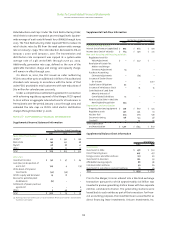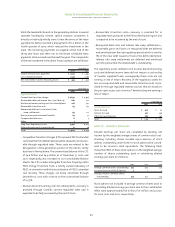ComEd 2002 Annual Report Download - page 87
Download and view the complete annual report
Please find page 87 of the 2002 ComEd annual report below. You can navigate through the pages in the report by either clicking on the pages listed below, or by using the keyword search tool below to find specific information within the annual report.
In connection with Exelon’s Risk Management Policy (RMP),
Exelon enters into derivatives to manage its exposure to fluctu-
ations in interest rates related to its variable rate debt instru-
ments, changes in interest rates related to planned future debt
issuances prior to their actual issuance and changes in the fair
value of outstanding debt which is planned for early retire-
ment. As it relates to energy transactions, Exelon utilizes deriv-
atives to manage the utilization of its available generating
capability and provisions of wholesale energy to its affiliates.
Exelon also utilizes energy option contracts and energy finan-
cial swap arrangements to limit the market price risk associ-
ated with forward energy commodity contracts. Additionally,
Exelon enters into certain energy related derivatives for trading
or speculative purposes.
As part of Exelon’s energy marketing business,Exelon enters
into contracts to buy and sell energy to meet the requirements
of its customers. These contracts include short-term and long-
term commitments to purchase and sell energy and energy
related products in the retail and wholesale markets with the
intent and ability to deliver or take delivery. While these con-
tracts are considered derivative financial instruments under
SFAS No. 133, the majority of these transactions have been des-
ignated as “normal purchases” or “normal sales” and are not
subject to the provisions of SFAS No. 133. Under these contracts,
Exelon recognizes gains or losses when the underlying physical
transaction affects earnings.Revenues and expenses associated
with market price risk management contracts are amortized
over the terms of such contracts. Commitments under these
contracts are discussed in Note 19—Commitments and
Contingencies. The remainder of these contracts are generally
considered cash flow hedges under SFAS No. 133. To the extent
that the hedges are effective, changes in the fair value
of these contracts are recorded in other comprehensive income,
until earnings are affected by the variability of cash flows
being hedged.
Additionally, during 2001, as part of the creation of Exelon’s
energy trading operation, Exelon began to enter into contracts
to buy and sell energy for trading purposes subject to limits.
These contracts are recognized on the balance sheet at fair
value and changes in the fair value of these derivative financial
instruments are recognized in earnings.
Prior to the adoption of SFAS No. 133, Exelon applied hedge
accounting only if the derivative reduced the risk of the under-
lying hedged item and was designated at the inception of the
hedge, with respect to the hedged item. Exelon recognized
any gains or losses on these derivatives when the underlying
physical transaction affected earnings.
Contracts entered into by Exelon to limit market risk associ-
ated with forward energy commodity contracts are reflected in
the financial statements at the lower of cost or market using
the accrual method of accounting.Under these contracts, Exelon
recognizes any gains or losses when the underlying physical
transaction affects earnings.Revenues and expenses associated
with market price risk management contracts are amortized
over the terms of such contracts.
New Accounting Pronouncements
In 2001, the FASB issued SFAS No. 143, “Asset Retirement
Obligations” (SFAS No. 143). SFAS No. 143 provides accounting
requirements for retirement obligations associated with tangi-
ble long-lived assets.Exelon will adopt SFAS No.143 as of January
1, 2003.Retirement obligations associated with long-lived assets
included within the scope of SFAS No. 143 are those for which
there is a legal obligation to settle under existing or enacted
law, statute, written or oral contract or by legal construction
under the doctrine of promissory estoppel. Adoption of SFAS
No. 143 will change the accounting for the decommissioning of
Generation’s nuclear generating plants as well as certain other
long-lived assets.
As it relates to nuclear decommissioning, the effect of this
cumulative adjustment will be to decrease the decommissioning
liability to reflect the fair value of the decommissioning obli-
gation at the balance sheet date. Additionally, SFAS No. 143 will
require the recognition of an asset related to the decommis-
sioning obligation, which will be amortized over the remaining
lives of the plants. The net difference, between the asset recog-
nized and the change in the liability to reflect fair value recorded
upon adoption of SFAS No.143, will be recorded in earnings and
recognized as a cumulative effect of a change in accounting
principle,net of expected regulatory recovery and income taxes.
The decommissioning liability will then represent an obligation
for the future decommissioning of the plants and, as a result,
accretion expense will be accrued on this liability until such
time as the obligation is satisfied.
Currently, Generation records the obligation for decommis-
sioning ratably over the lives of the plants.Based on the current
information and the credit-adjusted risk-free rate, we estimate
the increase in 2003 non-cash expense to impact earnings
before the cumulative effect of a change in accounting princi-
ple for the adoption of SFAS No. 143 by approximately $24 mil-
lion, after income taxes. Additionally, the adoption of SFAS No.
143 is expected to result in a large, non-cash,one-time cumula-
tive effect of a change in accounting principle gain of at least
$1.5 billion, after income taxes.The $1.5 billion gain and the $24
million charge includes our share of the impact of the SFAS No.
143 adoption related to AmerGen’s nuclear plants.These impacts
are based on our current interpretation of SFAS No. 143 and are
subject to continued refinement based on the finalization of
Notes To Consolidated Financial Statements
exelon corporation and subsidiary companies
85


